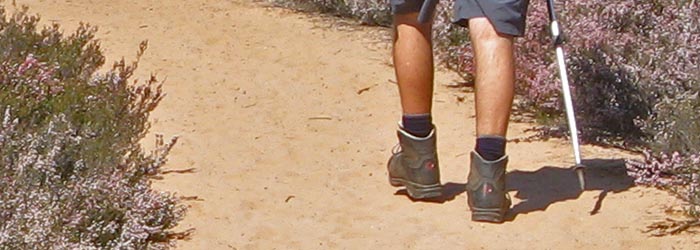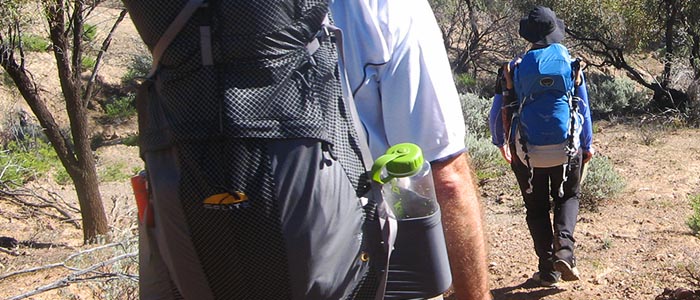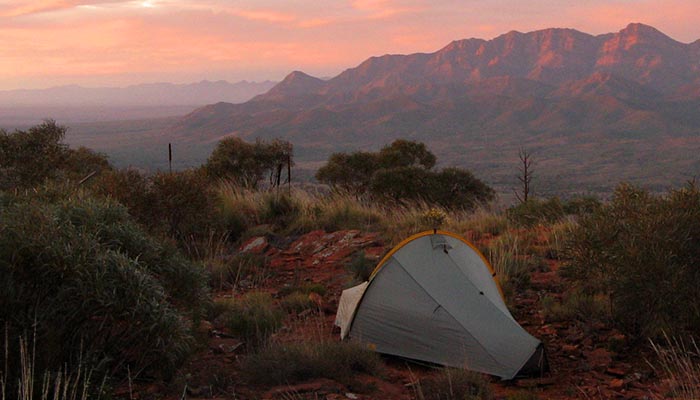Gear List – Weekend Walks
To participate in an activity, such as a weekend walk or hike, you should ensure you have suitable equipment, experience and ability before undertaking a walk. Prime consideration is your safety, comfort and weather protection.

Gear Hire – Try before you buy
The club hires out a variety of gear at reasonable rates, allowing prospective and full members to try out gear before buying their own. There is a wide range of the latest backpacks, tents and sleeping bags available which will help you to decide which equipment best suits you. Most people start walking in old clothes and second hand gear and gradually buy lighter and better bushwalking gear as they become more experienced and more involved.Staff in the outdoor shops that specialise in lightweight hiking & camping and other experienced club members are always willing to offer help and advice. A precinct of lightweight hiking stores can be found in Rundle Street, between Pulteney Street and just beyond Frome Road.
Gear Checklist
View the full Gear Checklist at the bottom of the page.Backpacks
All walkers need a good quality properly fitted backpack with a hip-belt. It needs to be large enough to carry food and gear without discomfort. Generally walkers select 55 to 85 litre backpacks for weekend walks.
Bushwalking Clothes
Most members walk in lightweight quick drying shorts, a shirt, a hat and boots. A fleecy jacket or old jumper and a long sleeved rain jacket are needed to keep out the cold and wet. It the walk involves walking through scrub, gaiters can be useful.Extra clothing should always be carried but keep additional spare clothing to a minimum. Avoid heavy, bulky items. All spare clothing not actually worn should be kept dry in plastic bags for use exclusively in the tent. If you do get wet, sleep in your dry ‘tent’ clothes and put your wet ones on again the next day.
Boots
Boots should be comfortable, well fitted, have a strong sole and provide ankle support. Most importantly, they should be large enough to take your feet and at least one pair of thick socks comfortably. The camping shops that specialise in lightweight pack-carrying gear can give professional advice regarding the right boot for you. This is one item that you will not be able to hire.Good sneakers can be worn as an alternative to boots on some of the easier day walks.
Tents and Sleeping Gear
Ideally, the tent should be waterproof nylon with two skins. Keep the tent pegs in a separate bag. Don’t forget to pack the pegs and poles as well. (Don’t laugh, it happens.) Seek advice about tents before purchasing. Always dry a wet tent as soon as possible or it will go mouldy.A groundsheet of strong plastic sheet is considered essential to place under the tent to protect its floor. It should be cut to fit the dimensions of the base of the tent but should not protrude outside.
There is a wide variety of choices in sleeping bags. Choice can be very personal, get advice from several sources. It is well worthwhile hiring or borrowing different types of sleeping bags before you buy one. An inner sheet of light cotton or silk will protect the inside of the bag and provide extra warmth. Most members also carry a foam or self-inflating sleeping mat for extra warmth and comfort.

Packing
Many walkers find a gear checklist useful.Always pack items in individual plastic bags and line the backpack with one large strong plastic bag (heavy duty garbage bags). Place all heavy items (ie sleeping bag, tent) close to the body in order to reduce the leverage on your shoulders. It is most important that you keep the weight to a minimum as the extra burden of a pack will tire the unfamiliar walker. Keep items that are frequently used at the top or in pockets. Always keep the first aid kit and trowel handy (eg. in an outside pocket). When walking in wet weather, pack your rain gear so that it is easily reached when required.
Enclose billies and cookers in cloth and/or plastic bags to avoid getting soot on other items. Dried foods such as sugar, milk, cereals etc. are best kept in small containers or double sealed plastic bags. Wet foods such as jam, honey, etc. are better stored in small aluminium or plastic containers. Refillable tubes are handy-for these foods.
Pairing up with another walker and sharing a tent or cooker can reduce pack weights.
Maps
It is a good idea to carry a map of the area in which you are walking and a compass. This provides an opportunity to learn/improve navigational skills. The leader can advise you on maps that will cover the trip.Gear Checklist
| Item | Day walk | Weekend Walk | 1 week Dry climate | 1 week Wet climate | |
|---|---|---|---|---|---|
|
Shelter
|
Pack | ||||
| Waterproof pack liner or dry bags | |||||
| Daypack | |||||
| Tent, poles & pegs | |||||
| Groundsheet | |||||
| Sleeping bag & inner liner | |||||
| Sleeping mat | |||||
|
Clothing
|
Rain-jacket | ||||
| Over trousers | |||||
| Light quick drying shirt | 1 | 1-2 | |||
| 100 Polartec fleecy or light jumper | |||||
| 200-300 Polartec fleecy or heavy jumper | |||||
| Spare under clothes | 1-2 | 3-5 | 3-5 | ||
| Light quick dry shorts or longs | |||||
| Thermal underwear | |||||
| Wide brim hat | |||||
| Sunglasses | |||||
| Gloves | |||||
| Balaklava or beanie | |||||
|
Footwear
|
Boots | ||||
| Camp shoes | |||||
| Socks | 1-2 | 2-3 | 2-4 | ||
| Gaiters | |||||
|
First Aid & Toilet
|
First aid kit | ||||
| Sunblock cream | |||||
| Lip balm | |||||
| Blister treatment equipment | |||||
| Toothbrush & paste | |||||
| Toilet paper & trowel | |||||
| Paracetamol and Anti-Inflammatory | |||||
| Personal medicines | |||||
| Puratabs, water filter or Tincture of Iodine | |||||
| Face cloth & soap or moist tissues. | |||||
|
Food
|
Food bag | ||||
| Separate Lunch Bag and scroggin bag | |||||
| 1-2 litre plastic rigid Water containers | |||||
| 5-10 Litre wine skins | |||||
| Stove Lighter/Matches | |||||
| Saucepan and lid | |||||
| Detergent & tea towel | |||||
| Rubbish bag | |||||
| Spare fuel | |||||
| Knife Fork Spoon | |||||
| Mug and Plate | |||||
|
Other
|
Torch, spare globe & batteries | ||||
| Compass, map & map holder | |||||
| Whistle | |||||
| Pocket knife | |||||
| Insect repellent | |||||
| Light book | |||||
| Camera & spare battery | |||||
| Spare film | |||||
| Spare Pack Buckle | |||||
| Money |













